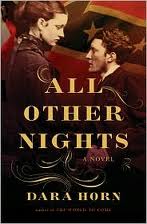 Dara Horn’s third novel combines her trademark cleverness, depth of Jewish knowledge, and strong literary sensibility into a fast-paced adventure-intrigue in which Jewish characters make a significant difference in the American Civil War.
Dara Horn’s third novel combines her trademark cleverness, depth of Jewish knowledge, and strong literary sensibility into a fast-paced adventure-intrigue in which Jewish characters make a significant difference in the American Civil War.
Jacob Rappaport, the 19-year-old son of a New York industrialist, joins the Union Army rather than accept the poor match his father, a well-connected businessman, has arranged for him through his business interests. As a soldier, Rappaport is immediately assigned a covert mission that only he can accomplish: infiltrate the South and visit Harry Hyams, the husband of his mother’s sister, in New Orleans. His orders are to poison his uncle who is planning to assassinate Abraham Lincoln.
Can he do it? Once in New Orleans, Rappaport visits the Jewish cemetery to mull over his impending mission. “If he had been a braver man, or a wiser man, he might have asked God what he was doing, or why he was doing it, or whether the dead around him, eternally burdened with their own remorse, envied him the chance to choose. But instead he looked at the sun and merely saw that the hour was growing late, and that it was time to continue, to do as he was told.”
Joining the Hyams family on the first night of Passover, Rappaport finds it more than peculiar to be “sitting down to a Passover seder, the feast of freedom, with every part of the meal served by slaves.” Another seder guest is the illustrious Judah Benjamin, the Southern Confederacy’s Jewish secretary of state. After overhearing his uncle discuss the assassination plot with Benjamin, Rappaport surreptitiously pours poison into his uncle’s wineglass. In Egypt God is about to slay the Egyption firstborns, but in New Orleans a Jewish Union spy is the great avenger who makes this night different from all other nights.
 Rappaport’s next assignment is not murder but something potentially far more perilous: marriage. The army orders him to wed one of the four daughters of Philip Levy, a former business associate of his father’s from Virginia: the Levy girls are part of a spy network that Rappaport’s superiors want him to infiltrate. Although he had refused the match his father had arranged, he ultimately marries the “bashert” the army has chosen for him. The difference? The beautiful Eugenia Levy, though far from trustworthy, bedazzles him and wins his heart.
Rappaport’s next assignment is not murder but something potentially far more perilous: marriage. The army orders him to wed one of the four daughters of Philip Levy, a former business associate of his father’s from Virginia: the Levy girls are part of a spy network that Rappaport’s superiors want him to infiltrate. Although he had refused the match his father had arranged, he ultimately marries the “bashert” the army has chosen for him. The difference? The beautiful Eugenia Levy, though far from trustworthy, bedazzles him and wins his heart.
Is the author making a statement about the nature of filial duty as opposed to civic duty? About the nature of love and marriage as close cousins of espionage and subterfuge? If so, she wastes no time in moralizing: her concern is to tell a good story.
As the plot unfolds, Horn’s well-wrought prose seems to crackle with cleverness as a dry log crackles in a hot fire. In this regard, her sophisticated word-play, sleight-of-hand narrative tricks and theatrical smoke and mirrors seem overtly Nabokovian at times. One of her silly villains is named William Wilhelm Williams the Third, reminiscent of Nabokov’s Humbert Humbert. And imagine having a bizarre character who speaks only in palindromes and anagrams — intelligibly, entertainingly, with no sign of running out of things to say.
A well-researched if overly fanciful historical drama, All Other Nights impresses upon us a new awareness of Jews at the heart of American affairs long before the great immigrant hordes began to arrive in the 1880s. The story is masterfully composed but plot-driven, the characters wittily drawn but not quite able to leap out of the page as genuine. Still, the book deserves to be applauded as a daringly imaginative coup and as the author’s best novel to date (the others have been In the Image and The World to Come). It is, one hopes, a token of good things yet to come from this extraordinarily talented writer. ♦
© 2009






